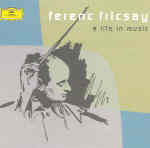This magnificent tribute to a great artist who died tragically young belongs in the collections of, well, everyone, and there’s so much to enjoy that it’s difficult to know where to begin. So let’s take it one disc at a time. We start off with a lively and sensitive Beethoven First Symphony, continue with a delicious Mendelssohn Midsummer Night’s Dream Overture and Incidental music, and wrap up with an elegant and vivacious Prokofiev Classical Symphony. In this last item, I like the relaxed first movement and swift finale–most performances make them sound almost the same.
Disc 2 is a treasure, and it’s all in stereo: Maureen Forrester’s sensitive singing of Mahler’s Rückert-Lieder followed by one of the all-time greatest Tchaikovsky “Pathétique” symphonies, never released in Fricsay’s lifetime because he reportedly wanted to make some corrections. It’s difficult to see what possibly could have bothered him: it’s a performance in perfect balance, equally intense and lyrical, with perhaps the most cogent first movement ever put on disc. Disc 3 delivers a jolly Respighi La Boutique fantasque and a comparatively disappointing Scheherazade (Rimsky’s, that is), in which the Berlin Radio Symphony Orchestra simply doesn’t have the requisite panache despite Fricsay’s sensible pacing and usual imagination in terms of phrasing.
Disc 4 is a Strauss family collection dating from the early 1950s, and it shows that like all great conductors Fricsay lavished as much attention on “light music” as on the larger masterpieces. The two overtures, Die Fledermaus and The Gypsy Baron, go especially well, but I wouldn’t want to be without the Blue Danube or Voices of Spring Waltzes either. Magrit Weber joins Fricsay on Disc 5 in an enterprising collection that includes a really fine Nights in the Gardens of Spain (which she later remade equally successfully with Kubelik), Francaix’s Concertino, Honegger’s Concertino, Franck’s Symphonic Variations, and a surprisingly successful Rachmaninov Paganini Rhapsody (in stereo).
Disc 6 is historically interesting rather than artistically rewarding, devoted as it is to contemporary works that despite Fricsay’s impassioned advocacy simply need better playing and sound than they get here. Von Einem’s little interlude from Danton’s Tod is a mere trifle, but Hindemith’s Symphonic Dances, Hartmann’s Sixth Symphony, and Frank Martin’s Petite Symphony Concertante are all masterpieces that have since received their due (repeatedly) on disc. Still, no portrait of Fricsay would be complete without these releases, which were very important in their day (1950-55).
The musical portion of the program (there’s an interview on Disc 9) ends with a glorious if generously cut version of Haydn’s The Seasons. Fricsay had a special affinity for choral music of all sorts (witness his Verdi Requiem), and he injects more color and sheer gusto into this music than any of the so-called “period instrument” people around today. The performance is worth hearing if only for the hilarious drunken chorus at the end of Autumn. Fine soloists (Maria Stader, Ernst Haefliger, and Josef Greindl) and the electricity of live performance (mono, from 1961) complete this irresistible and mostly superb package. Get it while you can. [3/30/2004]
































